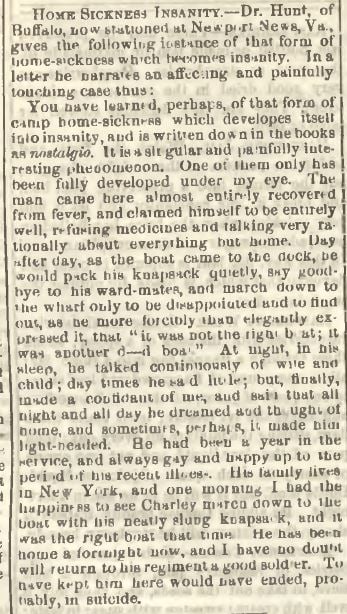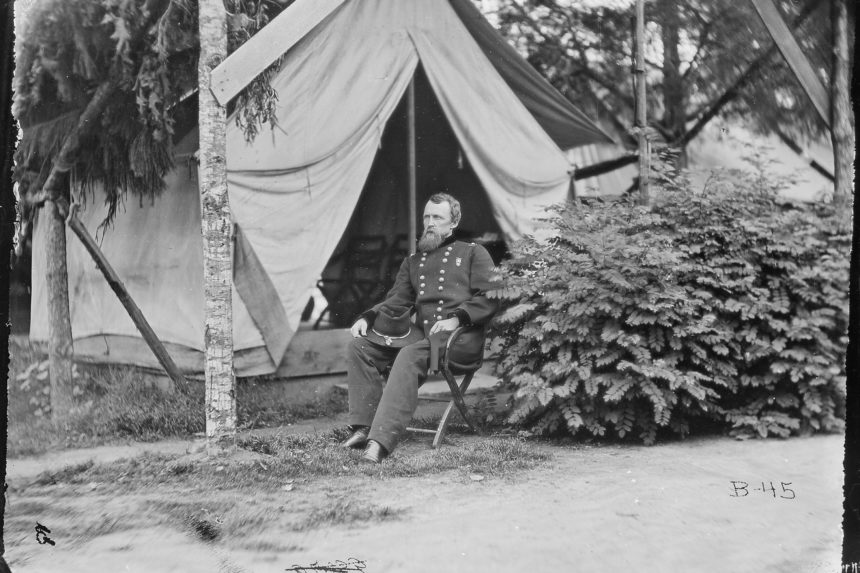Managing editor and logophile Andy Hollandbeck reveals the sometimes surprising roots of common English words and phrases. Remember: Etymology tells us where a word comes from, but not what it means today.
As you gather with friends and family during the holidays, your ruminations will likely lead you to remember other good times, leading to a sense of nostalgia, that bittersweet mix of pleasure and sadness. Nostalgia is commonplace at this time of year, but for 200 years it was considered an acute medical condition that could require hospitalization and lead to death.
The word nostalgia was created in the 17th century from New Latin derived from Greek roots. It begins with nostos “homecoming,” which derives from a much earlier root that means “to return safely home.” The second half comes from algos, meaning “pain or distress” — it also gives us neuralgia (nerve pain) and analgesic (what you take to fight body pain; an- means “without”).
The word first appeared in 1688 in a dissertation by Johannes Hofer, a young German doctor, as a Latin rendering of the German heimweh — “homesickness.” But this was not the standard concept of homesickness that we know today. Swiss mercenaries abroad in particular were thought to suffer from such a powerful homesickness that it could lead to insanity or even death.
Thus, nostalgia entered the English language as a medical diagnosis, and it remained so until the early 20th century. During America’s Civil War, nostalgia was considered a dangerous threat, especially among Union soldiers. In the August 2, 1862, issue of The Saturday Evening Post, one physician explains his experience with it:

HOME SICKNESS INSANITY — Dr. Hunt, of Buffalo, now stationed at Newport News, Va., gives the following instance of that form of home-sickness which becomes insanity. In a letter he narrates an affecting and painfully touching case thus:
You have learned, perhaps, of that form of camp home-sickness which developes [sic] itself into insanity, and is written down in the books as nostalgia. It is a singular and painfully interesting phenomenon. One of them only has been fully developed under my eye. The man came here almost entirely recovered from fever, and claimed himself to be entirely well, refusing medicines and talking very rationally about everything but home. Day after day, as the boat came to the dock, he would pick up his knapsack quietly, say good-bye to his ward-mates, and march down to the wharf only to be disappointed and to find out, as he more forcibly than elegantly expressed it, that “it was not the right boat; it was another d—d boat.” At night, in his sleep, he talked continuously of wife and child; day times he said little; but, finally, made a confidant of me, and said that all night and all day he dreamed and thought of home, and sometimes, perhaps, it made him light-headed. He had been a year in the service, and always gay and happy up to the period of his recent illness. His family lives in New York, and one morning I had the happiness to see Charley march down to the boat with his neatly slung knapsack, and it was the right boat that time. He has been home a fortnight now, and I have no doubt will return to his regiment a good soldier. To have kept him here would have ended, probably, in suicide.
By 1920, people had begun using nostalgia in a broader and less dire sense to indicate a wistful longing for the past — and that’s how we know the word today.
An interesting side note in nostalgia’s history involves a Swiss physician named Theodor Zwinger. In 1710, he reprinted Hofer’s original dissertation along with new case studies, but he replaced the word nostalgia with pothopatridalgia, reflecting his belief that Swiss soldiers weren’t missing their friends and family but were suffering from the ache (algos) of longing (pothos) for their homeland (patria, from which we derive patriotism).
Become a Saturday Evening Post member and enjoy unlimited access. Subscribe now




Comments
Honestly I’d never thought of the the origins of the word ‘nostalgia’ until now. It has to be the ultimate in “recovery” words that got one heck of a makeover shortly after World War I!
The suffix ‘algia’ (obviously) is still connected with conditions like neuralgia and fibromyalgia; I just never made the connection with nostalgia before. Hard to believe it went from very dire medical circumstances to basically fond memories of times past.
Truthfully, I first learned of the word back in February 1971 when LIFE magazine came in the mail with ‘Nostalgia’ featured on a “Valentine’s Day” style cover featuring 6 female movie stars of the past including beautiful Rita Hayworth. She would have turned 100 this year, surely giving her fans aware of that, a feeling of nostalgia for her.